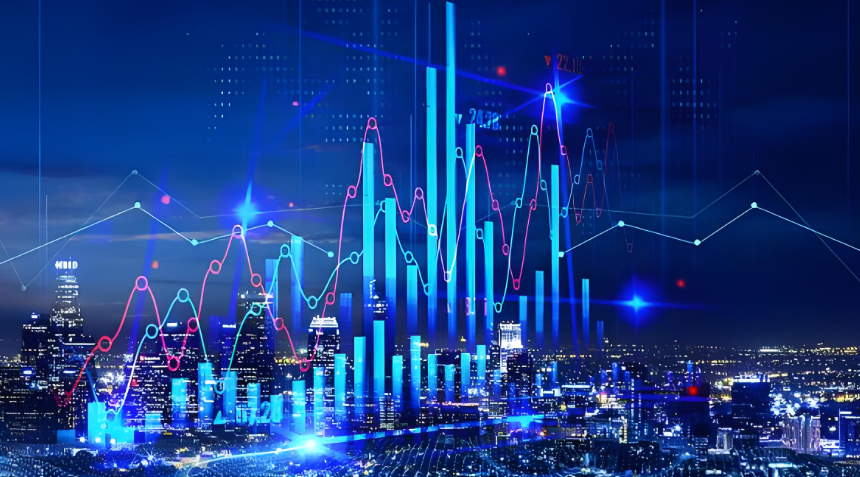Argentinian Stock Market Soars 180%
Advertisements
In a surprising twist, Wall Street's latest buzz isn't generated by cryptocurrency, electric vehicles, or even artificial intelligence. Instead, it revolves around Argentina, a nation long known for its financial turbulence and a notorious history of debt defaults that have earned it a less-than-stellar reputation among institutional investors.
Recently, hedge funds and other investment firms have set their sights on the Argentine market with renewed zeal, betting on the capabilities of President Javier Milei to revitalize an economy that has struggled for decades. While the outcomes of Milei's reforms remain to be fully evaluated in the annals of history, it is undeniable that this year, Argentina's capital markets have reaped considerable rewards.
The MERV index of Argentina has positioned itself as a frontrunner likely to become the best-performing stock index globally in 2024. Concurrently, prices for government bonds have surged, and ETFs tracking the MSCI Argentina Index have appreciated by over 60%.
But is Milei genuinely restoring confidence in the market?
Since taking office in December 2022, Milei has made bold pledges to drastically cut public spending. Over the past year, his administration has indeed executed these intentions by halting various public works, slashing funds allocated to provincial governments, and minimizing broad utility subsidies. One stark move was the attempt to narrow the chasm between the official exchange rate and the rates seen on the black market.
This shock therapy, however, has yielded extensive economic suffering, exacerbating an already high poverty rate, which hit 52.9% in the first half of 2024, marking the worst level seen in nearly two decades. Yet, some positive developments have recently emerged:
Argentina's inflation rate has significantly slowed from its previous peaks, and for the first time in over ten years, the country posted a quarterly fiscal surplus earlier this month. Data released indicated a remarkable 3.9% increase in GDP for the third quarter compared to the previous quarter, marking the first sign of economic growth since the recession that began at the end of 2023.

This series of events sparked a dramatic shift in investor perceptions toward a country long mired in political chaos, rampant inflation, and government overspending. Since winning independence in 1816, Argentina has defaulted on its sovereign debt nine times, with the latest default occurring in 2020.
Genna Lozovsky, Chief Investment Officer of London's Sandglass Capital Advisors, expressed astonishment over this swift transformation. "If Milei can maintain this fiscal anchor firmly, if the trend of declining inflation continues, and if Argentina can sustain its economic recovery, then bondholders should reasonably expect substantial returns," she remarked.
Looking back over the past year, it is evident that Argentine bonds have performed remarkably well. The ICE BofA Argentina Sovereign Index, which tracks the performance of Argentine sovereign dollar-denominated bonds, has realized an astonishing total return of approximately 90% in 2023.
In tandem, the MERV index has surged 179% as of Thursday, significantly outpacing various global developed and emerging market benchmarks.
While some may argue that the rally in Argentina's stock index partially benefits from the depreciation of the Argentine peso, even after adjusting for currency fluctuations, the index still boasts over a 100% rise when calculated in US dollars. In stark contrast, the S&P 500 index has experienced only a modest increase of 25% this year.
Suddenly, Argentina has transformed into the new darling of Wall Street.
There's no denying that the vigorous performance of Argentine assets this year has proven rewarding for those institutional investors who had the foresight to focus on this high-risk emerging market early on.
Aaron Stern, Chief Investment Officer at Converium Capital, noted, "Argentina has been our most lucrative investment this year. Generally speaking, I tend to avoid saying 'this time is different,' but I do believe that both the global and domestic conditions are more favorable for Argentina now than in previous years."
Stern recounted how Converium began purchasing Argentine sovereign bonds shortly after its founding in 2021, during a period when these bonds were greatly pressured following a 2020 debt restructuring. But with prices being low and the government under no strict obligation to repay debt anytime soon, Converium felt the downside risk was limited. Conversely, they saw a significant potential upside if the situation in Argentina were to improve.
According to a source familiar with the performance of Shiprock Fund, holdings in Argentine bonds contributed to a remarkable 34% gain for the company before November this year. This included bets on Argentine sovereign bonds, corporate bonds, and local debt from Buenos Aires.
Yet, looking ahead, Argentina's market is not without its share of obstacles and challenges that still require navigation.
For instance, ongoing foreign currency reserve shortages continue to worry investors. Alessandra Alecci, the portfolio manager of Carmignac's emerging market bond fund, estimated that Argentina's net foreign exchange reserves are short by approximately $8 billion. This has raised concerns over Argentina’s capability to fulfill obligations to international creditors. Still, she noted that it is challenging to harbor strong doubts regarding Milei's economic reforms at this stage.
In a bid to bolster the country's financial standing, Milei has sought new loans from the International Monetary Fund (IMF).
An IMF spokesperson shared during a recent press conference that negotiations with Argentina are currently underway.
post your comment